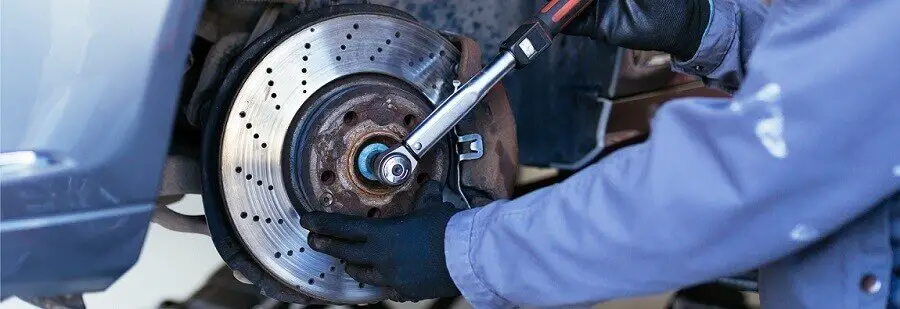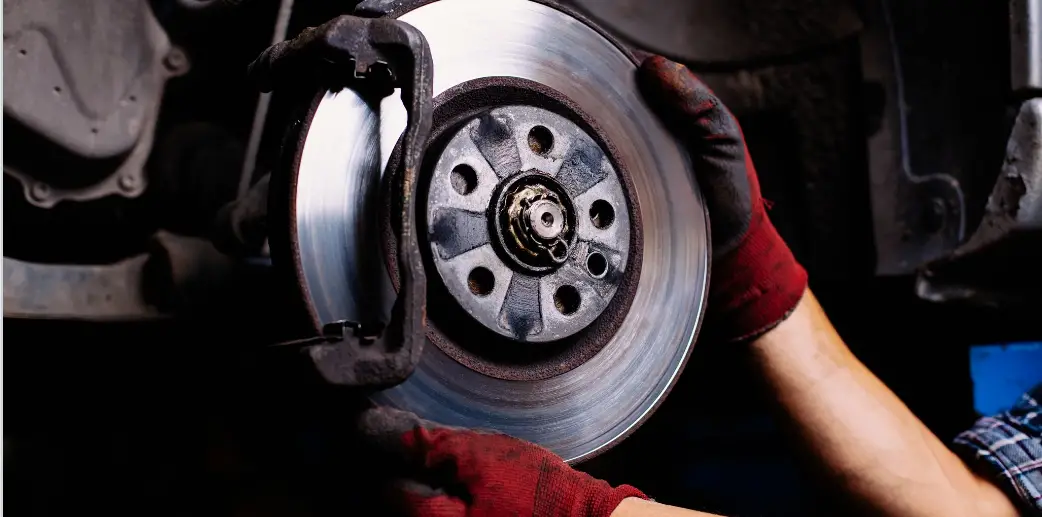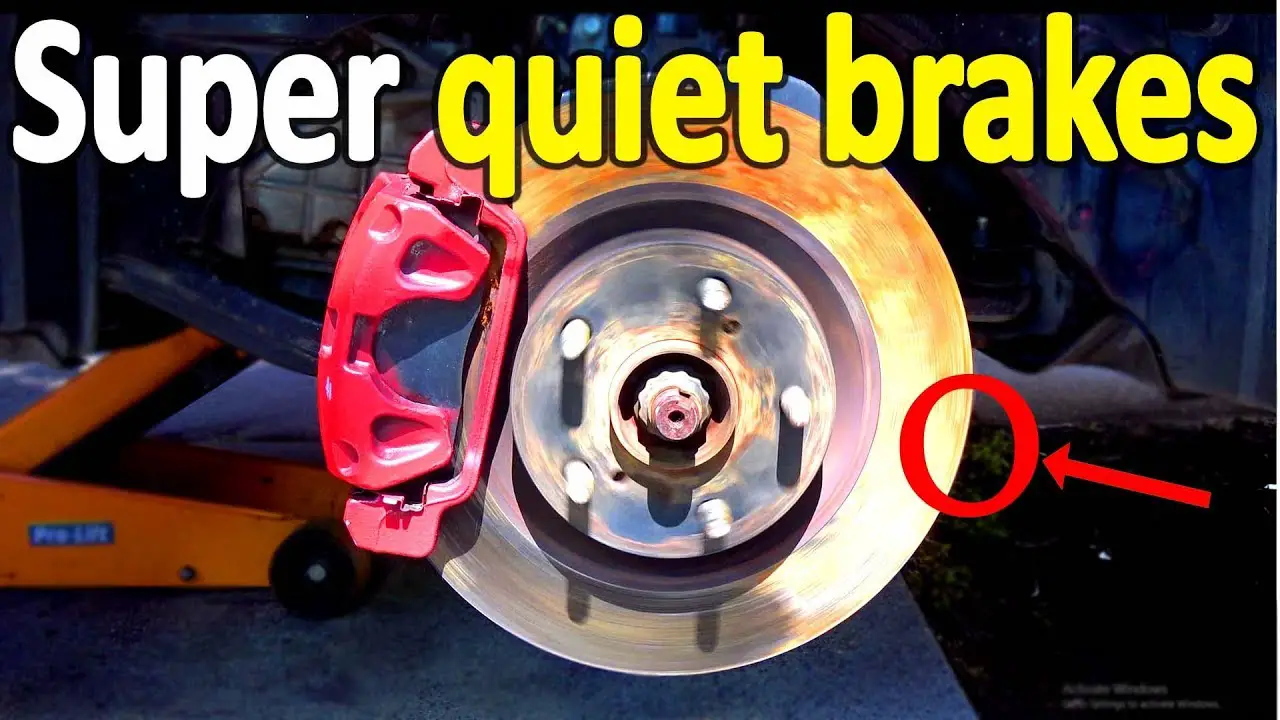What Causes Noise When I’m Driving Slowly
More often than not when you hear a squeaking sound when you’re driving slowly it’s a problem with your brakes. it could be you have some poorly fitted brake pads or discs that are causing the problem. It also could be indicative of worn wheel bearings.;
It’s obviously unusual for brakes to make noise when they’re not under extreme stress, like braking at high speeds or suddenly to avoid an accident. When they start making noise just from gentle application at low speed then it is cause for concern because it means something has definitely come out of alignment in some way. Especially if your brakes don’t make noise when you stop at normal speeds.
In general, brakes make noise because of the high-frequency vibrations that breaks are under as part of routine operation. Friction is what breaks rely on to actually work, so they’re constantly under some kind of stress. Caliper clamps squeeze the brake pads when you put your foot on the brakes which is what makes them work.; The brake pads grip the rotor and it slows your car down thanks to the power of friction. It’s also able to absorb all the heat created by this reaction and occasionally you will get noisy as a result.
Common Causes For Squeaky Brakes And Possible Solutions
One of the most common car problems youre likely to encounter is squeaky brakes. Theres a misconception that squeaky brakes always mean that your brakes need to be replaced. However, bad brakes are only one of the many possible reasons why your brakes might be squeaking. There are plenty of other reasons for them to squeak as well.
If you have squeaky brakes and want to get them fixed, bring your vehicle down to the Sedalia, MO brake repair & replacement specialists at Bryant Motors.
Your Car Whines While Youre Making A Turn
What it could mean: Youll hear a high-pitched whine if your vehicle has hydraulic power steering and you lock the steering wheel by turning it to the point at which it doesnt turn anymore. This strains the power steering pump, and if you hold this position for more than a few seconds, you risk damaging the pump. Back off about an inch from the lock position to ease the increase in pump pressure, and the noise should disappear. If you hear a constant whine, your pump is probably already damaged.
Find out what it could mean if your steering wheel shakes.
Don’t Miss: Florida Vehicle Title
Accumulation Of Moisture On The Brake Rotor
After using your vehicle for a while, you might start noticing some squeaking noises when you apply brakes. Accumulation of moisture can cause your brake squeal when wet and also cause your vehicles brake rotor to rust over time. Although, it can take some stops for your brake pads to remove this from your rotor. All you need is to regularly maintain your brake system as moisture cannot be prevented from touching the surface of your brake rotor except you stay in a desert.
How To Fix It Using The Emergency Brake

The third way I found by trial and error is a quick fix using the emergency brake. You will not find this procedure in any service manual or car repair manualnot even on car repair talk radio. It can be dangerous if not performed correctly, so please be careful. Nevertheless, I have done it on over 100 cars, including family members cars, and I would not recommend it if I thought it damaged the vehicle.
How this works is that you get your rear brakes to do 100% of the braking for a few seconds at a time instead of their usual 30%, and this causes the brake shoes to polish the grooves out of the drum. For safety reasons, only try this on cars that have an emergency brake handle in the center console; emergency brakes that come up out of the floor cant be set and released quickly enough.
Don’t Miss: How Much Does An Equus Bass 770 Cost
What Steps Should I Take To Have Repairs Made If Any
If a noise seems to be coming from the brake system, youll want to bring your vehicle in for repairs immediately
The first step to resolving the noise your car makes when braking a low speeds would be to know what is causing the noise. If it relates to the brakes, youll want to have it repaired immediately, as your vehicles brake system is a very important safety component.
Once you know what is causing the noise, you can make the decision to either repair the vehicle or wait until something more serious happens. The expert staff at Alexanders Import can make a recommendation as to whether or not its safe for you to continue driving your vehicle in its current condition.
From Squeaky To Quiet
Now you know the common causes of squeaky brakes. Depending on your case, the fix could be as simple as applying some grease, or you may need to perform a complete brake job.;
Disclaimer: This article is not intended to be a substitute for professional advice and is for information only. Always seek the advice of a certified professional or your vehicle manufacturer. If attempting any repairs yourself, take all safety precautions as necessary.
Don’t Miss: Does Reg 227 Need To Be Notarized
New Brakes Squeaking What You Should Know
You pull away from your car repair shop, feeling safer and more in control of your car. You just got new brake pads! A couple of miles down the road, however, you start hearing a noise coming from your brakes: sqeeuuaaaaaak! New brakes aren’t supposed to squeak, are they?
While some noises may be normal after a brake pad replacement, others can point to a brake issue. Get the rundown of what’s normal, what’s not, and when it may be time to get professional help to evaluate your brakes.
Brake Squeak Culprit #: Sticks & Stones
Squeaking or noisy brakes could be due to several reasons. That old saying about sticks and stones may break my bones applies here because, when it comes to your brake pads, they will also cause your brakes to make some pretty terrible squealing or squeaking noises!
In rural areas and homes where driveways are covered by large trees, it is not uncommon for your wheels to pick up a tiny twig, a small stone, an acorn, or other debris, which can cause your vehicle to make the most annoying noises.
If the squeaking sound occurs even when you havent stepped on the pedal, the prime suspect is a foreign object that is stuck between the brake pad and the rotor. If the object is something soft, such as a twig, it will wear down quickly and be thrown out of the wheel very shortly.
A stone, however, can cause real damage. If the noise doesnt disappear within a few miles, take it to back to your auto shop right away.
Also Check: How To Stop Car Windows From Fogging Up In Summer
What Causes Brakes To Squeak
Here are several reasons why your new brakes might be squeaking and noisy:
When You Brake Hard
Sometimes is unavoidable to slam your brakes, like when someone suddenly runs in front of your vehicle while driving or when you didnt see the red light on time, all these will cause you to apply pressure to your brake pads quickly, and this can cause your car to make a squeaking noise. Barking hard can affect the brake discs and rotor of your vehicle and wear out your brake pads. You have to be vigilant while driving so you can eliminate the chances of braking hard.
Recommended Reading: Form Mv-78b
Brake Squeak Culprit #: The Weather
If your brakes only seem to squeak in the morning or when it rains or is foggy, it could be due to the moisture in the air. This can cause a very thin layer of rust to build up on the rotors, which will cause the pads to squeak temporarily until they warm up and you wear off the rust by stopping a few times.
Most Common Cause: Cheap Low

Most commonly, brake squeaking is caused by inferior pads. A cheap brake job sounds good when youre paying for it, but it may come with years of painfully annoying squeakiness. Cheap brake pads have large metal flakes in the brake material, and when you press the brakes lightly and a flake drags along the rotor, it will squeak. The squeak may go away when that particular flake wears away, but usually there is another metal flake right behind it. The best way to avoid this type of noise is to choose quality brake pads.
Don’t Miss: Florida Title Copy
Timing Chain And Tensioner Noise
Timing chains can also cause the car make squeaking noise when driving slow problems to appear. So, why is this happening? This happens because the tensioner that is inside of your engine and makes sure that your chain is held tight breaks.
When the tensioner breaks, the chain gets loose. This can be extremely dangerous for your engine. If you noise squeaking or rattling coming from the engine, then you know that the chain is messed up.
In the worst-case scenario, the chain could jump from its position and the valves will get bent. Bent valves will scrap your engine, and make the engine be beyond repair. Since the repairs would be extremely expensive, sometimes its better to get a good used engine.
Replacing the chain will also cost you more than $1,000 to do. This is the case because the engine has to come out from the engine bay, and this work requires a lot of man-hours. This is another problem that torments a lot of owners of chain-driven cars.
But the good thing when driving a chain is that it could never break like timing belts can break. Sometimes, the chain can jump, but this doesnt happen on every engine since most of the engines have protection to prevent this from happening.
Although this sound is more like a rattle than a squeak, some people get confused and I thought is good to list this problem as well. Since you never know what could go wrong. These sounds with the chain also happen when the car is driving slow.
Causes Of Squealing Noise While Driving
Do you hear a squealing noise, particularly when accelerating or braking, while driving your car? Then this article will surely help you in diagnosing the source of the noise and effectively taking care of the problem.
Do you hear a squealing noise, particularly when accelerating or braking, while driving your car? Then this article will surely help you in diagnosing the source of the noise and effectively taking care of the problem.
A smoothly functioning car is like a tuned piano, with each of the mechanical parts working in harmony, and every note falling in place, to create the beauty of a smooth drive. When these harmonious sounds are disturbed by the out-of-sync bad notes of a squealing noise, it can be really annoying. You need to isolate the bad player from the car orchestra and fix or replace it soon.
The aim of writing this WheelZine article is to help you diagnose the source of squealing or squeaking noise when driving your car and restore the beautiful harmony of its functioning.
Noise is any kind of chaotic, incoherent sound, which cannot be traced to any of the normal car functions. Expert technicians, not unlike trained masters of orchestra, can easily find the source of bad notes, as they are used to hearing the orchestra almost everyday.
Recommended Reading: Columbo’s Car
Whatcauses New Brake Pads To Squeak
Brake pads squeaking can indicate that your brakes require urgent attention. However, after replacing these parts, your new brake pads can still squeak, this can be very frustrating.
Some reasons why your new brakes may squeal includes:
How Often Do You Need To Change Brake Pads
It all depends on driving habits and conditions. If you drive on the highway all the time, your brakes could last up to 100,000 miles. If you use your vehicle to make deliveries in the city, you could find yourself replacing brakes every 15,000 miles
Another thing to consider is the type of brake pad you’re installing. Some aftermarket pads are very cheap and do not last long. Cheap pads also tend to be very squeaky.
Recommended Reading: Is Car Warranty Worth It
Most Common Brake Noises: Causes And How To Fix Them
Eddie spent 35 years in the automotive business with Honda. He is an ASE Certified Master Technician and has bruised knuckles to prove it.
As a mechanic, the three most common brake noises I get complaints about are grinding, thumping, and squeaking.
What Can Be Done
If the squealing is abnormally loud, look for brake pad dust on the wheels, a strong indication of excessive brake pad wear. In any case, have the brakes inspected and checked for pad wear. If you find that repair is necessary, replace the pad shims and the high-temperature grease, and, if indicated, the brake pads as well.
From dealership records or from the customer, find out when the current pads were installed. If thickness of the friction material shows that the remaining usable lining will not last until the next scheduled service, have the brake pads replaced.
Note: Easy braking customers, who usually get high mileage out of a set of brake pads, would find that these softer pads make less noise, and any difference in wear and braking performance would be undetectable.
Recommended Reading: How To Change The Interior Of Your Car
Brake Squeak Culprit #: The Brake Pad Material
Your grandfather might tell you that he remembers a time when brake pads and shoes were made with asbestosand he wishes they still were! Those old school brake pads rarely squeaked, but they also posed serious health hazards to the mechanics who unwittingly breathed in the brake dust laden with asbestos.
Many brake pads today are made of ceramic, which are great for how long they last and how well they stop the vehicle. But they can also cause a great deal of noise on your cast iron rotors. Take a butter knife and scrape it across a ceramic plate and you will hear a similar squeaking/squealing sound.
If your mechanic installed ceramic pads and theyre noisy, see if he/she would be willing to exchange them for semi-metallic pads. These tend to be a bit quieter than ceramic pads.
Steering Wheel Housing Rubbing Against Interior Trim

It’s a common problem during hot weather and for brand new cars when the steering wheel housing rubs against the interior trim. If this occurs, the vehicle will produce loud squeaks.;
During hot days, the materials inside expand. In effect, the components fill all the gaps and bump other components.
More than that, the steering metal closes up the gap between the interior trim. As a result, the two parts collide, making it difficult for the wheels to turn.
Read Also: How To Get Paper Title In Florida
